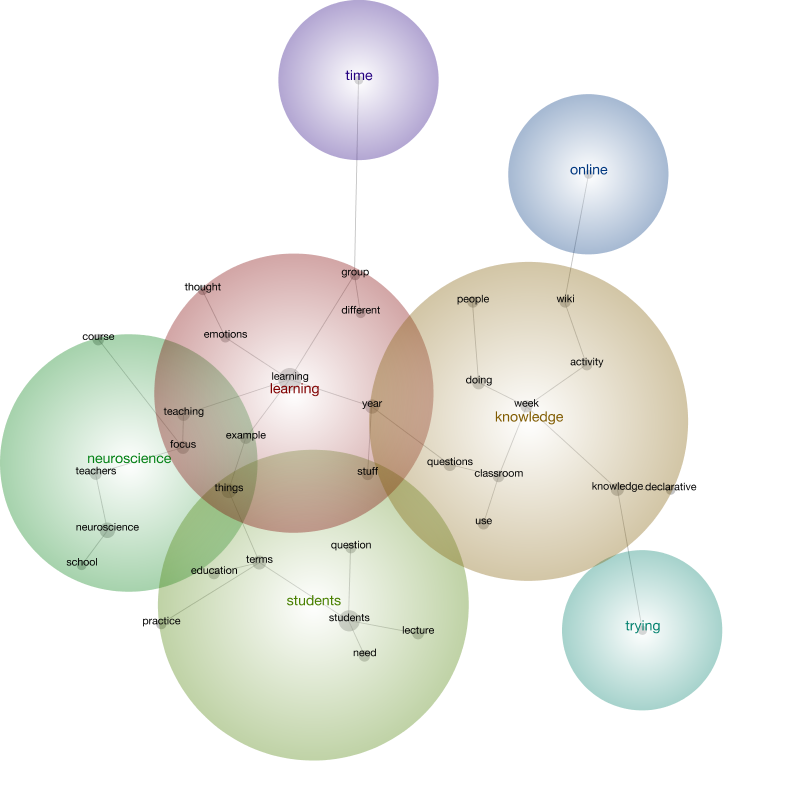The project was assessed via:
- Student perspective: (i) qualitative online questionnaire, via the Blackboard online survey tool – gathering student feedback on active learning approaches embedded in the course; (ii) student interview, one participant responded to questions developed from a preliminary analysis of the survey data.
- Thematic analysis from online questionnaire – the following figure (Diagram 1), is a Leximancer diagram of the relationships between the thematic terms most used by students in the qualitative questionnaire. The four most interrelated terms used in student responses were: ‘knowledge’; ‘learning’; ‘students’; ‘neuroscience’. Of note, is the merging of these key themes, including the introduction of ’neuroscience’ with flow-ons to the perception of their own future teaching practices, e.g. via links to themes including ‘teachers’, ’teaching’, ’classroom’, and ’practice’.


Diagram 1: Relationship of terms most used by students in qualitative questionnaire
The detailed thematic analysis of the qualitative student survey found that effective learning approaches engaged students via:
- A focused inclusion of brain research, cognition and neuroscience
The survey revealed that the majority of respondents expressed both positive and negative aspects about the incorporation of neuroscience into the course curriculum. 68% of respondents (19 students out of n=28) felt there were positive aspects. These included: it was interesting and/or important to learn; assisted their understanding re. learning; assisted their application of same to teaching, or facilitated metacognition processes.
Sample student quote – “I think it's really interesting to look at the scientific spectrum of education. It made me reflect on my own learning experience, it was quite fun when I was able to backup my behaviour with the information I was taught!"
61% of respondents (17 students) also expressed some aspects they disliked about incorporating neuroscience into the teaching practice; although the majority of these students also felt there were many positive aspects, as detailed above. Their concerns included: finding the content difficult or confusing, and feeling that it needed to link more to the rest of course/learning. A handful of students would have liked more hard-science in the neuroscience content provided.
- Authentic/real world learning
Guest lecture at the Queensland Brain Institute (QBI), on “A Neuroscientist Perspective of Learning” including a set of six Fact or Fiction questions that were embedded within the lecture.
The majority of students expressed both positive and negative comments about their experience and impressions of the QBI lecture. 82% of the respondents considered the experience positive. They found at least part of the lecture interesting. The information was appreciated and they liked being in the building on excursion. 61% of respondents made a negative comment about the QBI lecture and most of these were about the relevance of the content to the rest of the course and to teaching. 28% of the respondents felt the content was too difficult for them to understand.
Sample student quote – “I actually really enjoyed the 'excursion' to the QBI. It was interesting and stimulated the idea of metacognition within the course. Would do to it again and would recommend its use in the course next year."
- Collaborative learning – Wiki participation and use in group assessment
80% of students (23 students out of n=28) found some positive aspects about the Wiki as a learning activity, with 50% (14 students) expressing only fully positive aspects. Examples included that it was a good or great idea to assist collaboration with other students, and in some cases with tutors; that it was useful to view others' work to assist to interpret the topic, and it was a good modelling tool that assisted learning. A number of students also expressed that it will be a useful tool within their own teaching practice, as well as an appreciation for the SOLO taxonomy approach used to assist a deeper understanding of student learning outcomes.
- Pre-service teacher students become peripheral participants in a community of practice dedicated to finding new insights about learning – including students encouraged to sign up to the Nature Partner Journals (NPJ) online community newsletter.
My personal observation as course coordinator indicates that a small assessment item linked to the signing up and perusing of this community newsletter would have improved student engagement with this aspect of the teaching innovation.
- Lectures, tutorials and weekly Blackboard online logbooks
Sample student quote – ”As an exchange student who has taken many education classes back in the United States, I was pleasantly surprised by the inclusion of brain research, cognition and neuroscience in this education course. Most education classes I have taken fail to do this. Neuroscience is actually very relevant to educational studies and I think it is something very important to know for people studying to be teachers. From the times we looked at topics related to neuroscience in this course, I have learned things that have given me insight into a student's brain, which I find very valuable. It has taught me the science behind the learning process, which is important to know when thinking about how I can teach well to the class.”
- Use of SOLO taxonomy which utilises the threshold concept of ‘understanding’
My personal observation as course coordinator indicates that the SOLO taxanomy was a well-liked tool amongst students. The table structure helped students understand the layers of ‘understanding’ as a process rather than a one-point outcome.


